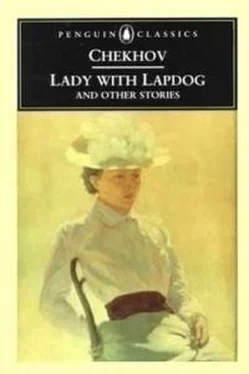"You have probably forgotten your letter by now. But I have kept it. I understand your mood at the time, and, I must own, I respect that letter. 'Damnable cold blood,' 'Asiatic,' 'coarse laugh'—that was charming and characteristic," he went on with an ironical smile. "And the fundamental thought is perhaps near the truth, though one might dispute the question endlessly. That is," he hesitated, "not dispute the thought itself, but your attitude to the question—your temperament, so to say. Yes, my life is abnormal, corrupted, of no use to any one, and what prevents me from beginning a new life is cowardice—there you are quite right. But that you take it so much to heart, are troubled, and reduced to despair by it—that's irrational; there you are quite wrong."
"A living man cannot help being troubled and reduced to despair when he sees that he himself is going to ruin and others are going to ruin round him."
"Who doubts it! I am not advocating indifference; all I ask for is an objective attitude to life. The more objective, the less danger of falling into error. One must look into the root of things, and try to see in every phenomenon a cause of all the other causes. We have grown feeble, slack—degraded, in fact. Our generation is entirely composed of neurasthenics and whimperers; we do nothing but talk of fatigue and exhaustion. But the fault is neither yours nor mine; we are of too little consequence to affect the destiny of a whole generation. We must suppose for that larger, more general causes with a solid raison d'être from the biological point of view. We are neurasthenics, flabby, renegades, but perhaps it's necessary and of service for generations that will come after us. Not one hair falls from the head without the will of the Heavenly Father—in other words, nothing happens by chance in Nature and in human environment. Everything has its cause and is inevitable. And if so, why should we worry and write despairing letters?"
"That's all very well," I said, thinking a little. "I believe it will be easier and clearer for the generations to come; our experience will be at their service. But one wants to live apart from future generations and not only for their sake. Life is only given us once, and one wants to live it boldly, with full consciousness and beauty. One wants to play a striking, independent, noble part; one wants to make history so that those generations may not have the right to say of each of us that we were nonentities or worse…. I believe what is going on about us is inevitable and not without a purpose, but what have I to do with that inevitability? Why should my ego be lost?"
"Well, there's no help for it," sighed Orlov, getting up and, as it were, giving me to understand that our conversation was over.
I took my hat.
"We've only been sitting here half an hour, and how many questions we have settled, when you come to think of it!" said Orlov, seeing me into the hall. "So I will see to that matter…. I will see Pekarsky to–day…. Don't be uneasy."
He stood waiting while I put on my coat, and was obviously relieved at the feeling that I was going away.
"Georgy Ivanitch, give me back my letter," I said.
"Certainly."
He went to his study, and a minute later returned with the letter. I thanked him and went away.
The next day I got a letter from him. He congratulated me on the satisfactory settlement of the question. Pekarsky knew a lady, he wrote, who kept a school, something like a kindergarten, where she took quite little children. The lady could be entirely depended upon, but before concluding anything with her it would be as well to discuss the matter with Krasnovsky—it was a matter of form. He advised me to see Pekarsky at once and to take the birth certificate with me, if I had it. "Rest assured of the sincere respect and devotion of your humble servant…."
I read this letter, and Sonya sat on the table and gazed at me attentively without blinking, as though she knew her fate was being decided.
IN the course of the maneuvres the N― cavalry regiment halted for a night at the district town of K―. Such an event as the visit of officers always has the most exciting and inspiring effect on the inhabitants of provincial towns. The shopkeepers dream of getting rid of the rusty sausages and "best brand" sardines that have been lying for ten years on their shelves; the inns and restaurants keep open all night; the Military Commandant, his secretary, and the local garrison put on their best uniforms; the police flit to and fro like mad, while the effect on the ladies is beyond all description.
The ladies of K―, hearing the regiment approaching, forsook their pans of boiling jam and ran into the street. Forgetting their morning deshabille and general untidiness, they rushed breathless with excitement to meet the regiment, and listened greedily to the band playing the march. Looking at their pale, ecstatic faces, one might have thought those strains came from some heavenly choir rather than from a military brass band.
"The regiment!" they cried joyfully. "The regiment is coming!"
What could this unknown regiment that came by chance to–day and would depart at dawn to–morrow mean to them?
Afterwards, when the officers were standing in the middle of the square, and, with their hands behind them, discussing the question of billets, all the ladies were gathered together at the examining magistrate's and vying with one another in their criticisms of the regiment. They already knew, goodness knows how, that the colonel was married, but not living with his wife; that the senior officer's wife had a baby born dead every year; that the adjutant was hopelessly in love with some countess, and had even once attempted suicide. They knew everything. When a pock–marked soldier in a red shirt darted past the windows, they knew for certain that it was Lieutenant Rymzov's orderly running about the town, trying to get some English bitter ale on tick for his master. They had only caught a passing glimpse of the officers' backs, but had already decided that there was not one handsome or interesting man among them…. Having talked to their hearts' content, they sent for the Military Commandant and the committee of the club, and instructed them at all costs to make arrangements for a dance.
Their wishes were carried out. At nine o'clock in the evening the military band was playing in the street before the club, while in the club itself the officers were dancing with the ladies of K―. The ladies felt as though they were on wings. Intoxicated by the dancing, the music, and the clank of spurs, they threw themselves heart and soul into making the acquaintance of their new partners, and quite forgot their old civilian friends. Their fathers and husbands, forced temporarily into the background, crowded round the meagre refreshment table in the entrance hall. All these government cashiers, secretaries, clerks, and superintendents—stale, sickly–looking, clumsy figures—were perfectly well aware of their inferiority. They did not even enter the ball–room, but contented themselves with watching their wives and daughters in the distance dancing with the accomplished and graceful officers.
Among the husbands was Shalikov, the tax–collector—a narrow, spiteful soul, given to drink, with a big, closely cropped head, and thick, protruding lips. He had had a university education; there had been a time when he used to read progressive literature and sing students' songs, but now, as he said of himself, he was a tax–collector and nothing more.
He stood leaning against the doorpost, his eyes fixed on his wife, Anna Pavlovna, a little brunette of thirty, with a long nose and a pointed chin. Tightly laced, with her face carefully powdered, she danced without pausing for breath—danced till she was ready to drop exhausted. But though she was exhausted in body, her spirit was inexhaustible…. One could see as she danced that her thoughts were with the past, that faraway past when she used to dance at the "College for Young Ladies," dreaming of a life of luxury and gaiety, and never doubting that her husband was to be a prince or, at the worst, a baron.
Читать дальше












